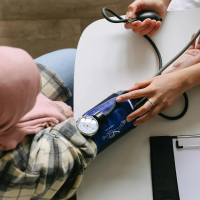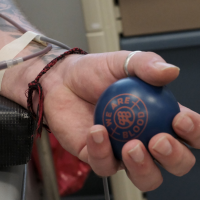Don’t get fooled!
If you or someone you know thought you were ineligible to donate blood or platelets for various reasons, you may have been fooled by rumors. This April Fool’s Day, we are debunking some of the common misunderstandings around blood donation and eligibility.
 Myth 1: I have tattoos or piercings.
Myth 1: I have tattoos or piercings.
At We Are Blood, anyone can donate blood immediately after getting a tattoo or piercing, if they received it in a state-regulated parlor.
Otherwise, you’ve got to wait three months to donate.
 Myth 2: I’m too old.
Myth 2: I’m too old.
You’re never too old to donate blood! Seriously! There is no maximum age limit. However, there is a minimum one.
You can donate starting at age 17, and then for the rest of your life if you meet all other eligibility criteria.
 Myth 3: I’ve had cancer.
Myth 3: I’ve had cancer.
It is possible for some people who’ve had cancer to donate, but it varies by type and medical condition. If it has been more than 1 year since the end of your treatment and you haven’t had any signs of cancer coming back in the last 12 months, you may be able to donate.
Unfortunately, if you’ve had blood cancers like leukemia, lymphoma, or multiple myeloma, you won’t be able to donate blood or blood products.
 Myth 4: I have high blood pressure.
Myth 4: I have high blood pressure.
This isn’t always true. Before you donate, you participate in a brief health exam, during which your blood pressure is taken. If the top number of the reading is below 180 and the bottom number is below 100, your blood pressure won’t prevent you from being able to donate. Even if you’re on blood pressure medication, you may still qualify.
If fact, in most cases, medication will not disqualify a blood donor. However, there are a handful of drugs that may involve a waiting period to donate after the last dose is taken. Check out the medications section of our eligibility page to learn more.
 Myth 5: I lived in or traveled to Europe.
Myth 5: I lived in or traveled to Europe.
You may be eligible to donate! We Are Blood has implemented FDA guidance lifting prior geographic risk-based deferrals for vCJD (commonly referred to as Mad Cow Disease). The update removes an eligibility barrier for many Europeans, active and former U.S. service members who were stationed in the UK, Ireland or France, their family members, and more.
Individuals who have attempted to donate at We Are Blood in the past but were deferred to geographic risk for vCJD will need to submit a re-entry form, here.
 Myth 6: I’m gay.
Myth 6: I’m gay.
As of September 6, 2023, We Are Blood implemented the latest FDA guidance, expanding donor eligibility for some LGBTQ community members. With this update, the gender of a donor and their sexual partners will no longer be a consideration for donor eligibility.
Under the revised guidance, any donors who report having had a new sexual partner, or more than one sexual partner in the past three months and having anal sex, must wait to donate for three months from the date they most recently had anal sex.
If you have anal sex with one person that you’ve been with for at least three months, you will be able to donate if you meet all other eligibility criteria. Donors who have one sexual partner they’ve been with three months or longer won’t be asked about anal sex. Learn more about the new guidance here.
 Myth 7: I’m AB blood type, so my blood isn’t needed.
Myth 7: I’m AB blood type, so my blood isn’t needed.
No matter what your blood type is, it is needed and valuable.
Want to make sure you’re making the biggest impact with your donation? While the community needs for each blood type change daily, this breakdown provides a nice reference.
- O Negative and O Positive donors are generally recruited to be whole blood donors. (O Negative is the universal donor type, and O Positive can be given to anyone with positive blood type.)
- A+, B+, AB+ & AB- blood types can be perfect candidates for donating platelets. Want to learn more? Click here.
 Myth 8: I’ve received a blood transfusion.
Myth 8: I’ve received a blood transfusion.
No worries!
If it has been more than 3 months since the end of your treatment, you may be able to donate.
 Myth 9: Donating will deplete my blood supply
Myth 9: Donating will deplete my blood supply
Donating blood will not deplete your own blood supply due to the human body’s ability to quickly regenerate blood cells
The average adult body contains 10-12 pints of blood. When you donate blood, only one pint is collected. Your plasma levels can return to normal in as little as 24 hours. Platelets replenish within 5-7 days, and red blood cells take four to six weeks to restore; that is why you can donate whole blood every 56 days and platelets every 7 days.
 Myth 10: Vegetarians or vegans cannot donate blood.
Myth 10: Vegetarians or vegans cannot donate blood.
Individuals who don’t eat meat may totally donate blood! They just need to pay close attention to their iron levels after donation, as it may be harder for them to replenish the iron lost during whole blood or double red cell donation. An iron supplement may be a consideration, after consulting with their physician, for regular veg donors.
Still have concerns?
Our team is always here to help you navigate this process. We want our donors to be informed and comfortable each step of the way, so you can walk into a donor center or mobile drive confident about your life-saving impact
If you have more questions about eligibility or want to learn more about any of the myths addressed here, contact our eligibility specialist at whocandonate@weareblood.org to get your questions answered.
Whether you give once or become a regular donor with us, every donation matters. Help us save lives locally and schedule your donation today!












